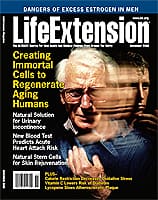 | November 4, 2008 | | | | An article published online on October 21, 2008 in the journal Nutrition & Metabolism reported the discovery of Italian researchers of an association between decreased plasma levels of several antioxidants and early carotid atherosclerotic lesions in asymptomatic middle-aged individuals. “Atherosclerosis remains clinically mute for a long time and frequently manifests itself with an acute cardiovascular event; therefore, the possibility of detecting the disease in a subclinical phase and reducing or reversing its progression is an issue of relevance,” the authors write. “Antioxidants, which may inhibit lipid peroxidation, could play an important protective role against the formation of simple and complex atherosclerotic lesions, which progressively protrude into the arterial lumen, causing stenosis or occlusion. In particular, increased carotid intima-media thickness represents an early phase of the atherosclerotic process and is widely used as a marker of subclinical atherosclerosis which correlates with established coronary heart disease.” Two hundred twenty men and women between the ages of 45 and 65 without history of transient ischemic attack, stroke, or other conditions related to carotid artery disease were enrolled at the San Camillo de Lellis Hospital, in Manfredonia, Italy. Participants underwent ultrasonographic evaluation of the extracranial carotid arteries, and blood samples were analyzed for lipids, C-reactive protein and other factors, in addition to plasma levels of vitamin A, vitamin E, beta-carotene and lycopene. One hundred twenty-five participants were found to have carotid atherosclerosis as determined by carotid intima-media thickness of 0.8 millimeters or more. Body mass index, plasma hemoglobin, and high-density lipoprotein cholesterol were marginally higher among those diagnosed with atherosclerosis, and all of the nutrients measured were significantly reduced. Vitamin A, vitamin E, and lycopene levels were decreased by 50 percent or more among those with atherosclerosis compared with participants who were not diagnosed with the condition, and beta-carotene levels were less than a third of those without atherosclerosis. Oxidative stress resulting from the oxidation of low-density lipoprotein (LDL) cholesterol in the wall of the artery results in inflammation which stimulates the differentiation of immune system cells called monocytes into macrophages. Macrophages accumulate lipids to form foam cells which thicken the walls of the artery. Antioxidants such as those evaluated in the current study could help protect against this process by preventing LDL oxidation. “Regular intake of foods rich in lycopene and other antioxidant vitamins may slow the progression of atherosclerotic processes and modify the early stages of atherosclerosis, with a consequent reduction in cardiovascular events,” the authors conclude. | |  |  | | Perhaps the most widely used screening tool for stroke is the carotid ultrasound, which provides physicians with valuable information on the health of carotid arteries. Using widely available and relatively inexpensive ultrasound technology, physicians can detect the degree of blockage in the carotid arteries and measure the thickness of the intima-media. The well-known Rotterdam study showed that if carotid intima-media thickness is greater than 1 mm, the risk of stroke is increased even if no arterial plaque is present (Hollander M et al 2003). The information obtained from ultrasound screening can be used to identify people at high risk of atherosclerosis. Multiple studies have found that a diet high in fruits and vegetables lowers risk of cerebrovascular disease and both ischemic and hemorrhagic stroke (Gariballa SE 2000; Sauvaget C et al 2003). Two major reviews recommended that public health policy promote increased dietary intake of antioxidant vitamin C, beta-carotene, vitamin E, B vitamins (including folate), potassium, calcium, magnesium, vitamin D, fiber, and omega-3 fatty acids to reduce risk of stroke (Gariballa SE 2000; Johnsen SP 2004). These vital nutrients can also be obtained through dietary supplements in conjunction with a healthy diet. Large long-term studies have found that daily dietary intake of beta-carotene plays a protective role against atherosclerosis and decreases risk of ischemic stroke (Hak AE et al 2004; Hirvonen T et al 2000). Rich sources of beta-carotene include carrots, squash, green leafy vegetables, milk, lean meat, fish, and poultry. Vitamin E is an antioxidant. It regulates oxidation reactions and protects polyunsaturated fatty acids and vitamin A. A large study supplying people with foods that have high levels of vitamin E (plant oils, green leafy vegetables, whole grains, butter, liver, egg yolk, milk, nuts, and seeds) found that higher intake of vitamin E helped reduce risk of death from stroke (Yochum LA et al 2000). Another study reported that eating foods high in antioxidant vitamins C and E helped lower the incidence of stroke, especially notable in smokers (Voko Z et al 2003). | Life Extension magazine November, 2008 issue now online! 
- On the cover:
- Reports:
- Departments:
- Scientific abstracts:
| |  |   | | The most popular digestive supplement used by Life Extension members is Enhanced Super Digestive Enzymes. An upgraded version is now available that contains the encased, patented GanedenBC30™, which are designed to repopulate the intestines with friendly bacteria. Your colon is a perfect breeding ground for many opportunistic bacteria that can multiply and cause inflammatory upsets and other digestive problems. In order to maintain a healthy digestive system, your body hosts beneficial bacteria in its gastrointestinal tract that defend against harmful microorganisms. But poor diet, age, stress and antibiotic use can all rob you of these good bacteria. The result can be compromised immune function, disturbances in bowel function and other digestive discomforts. A new patented strain of Bacillus coagulans (GanedenBC30™) provides this beneficial bacteria in a protected spore form similar to a seed. Like a seed, GanedenBC30™ will stay dormant until it has the right conditions to grow, such as the intestines, which are the perfect environment for the Bacillus coagulans to proliferate. | | | Cognitex with NeuroProtection Complex  |
| Cognitex is formulated to take advantage of the latest developments and ingredients for cognitive health. The latest ingredient in the Cognitex formula is uridine-5’-monophosphate, a critical brain nutrient. Uridine-5’-monophosphate (UMP) is a basic building block of RNA and DNA as well as of phosphatides such as phosphatidylcholine that are critical to optimal brain function and the health of neuronal cell membranes. Naturally found in the milk of nursing mothers, UMP is essential not only for the growth and development of infant brains, but also for healthy cognitive function in aging adults. Dietary supplementation with UMP may increase brain acetylcholine and phosphatide levels, and enhance some cholinergic functions. The Cognitex formula provides other critical extracts that support healthy brain function, such as blueberry standardized with both anthocyanins and pterostilbene. | | | |  | | Life Extension Update | | What's Hot | | Life Extension magazine | |
















